Christian Apologetics: Refuting Claims of Hypocrisy and Intolerance
VerifiedAdded on 2023/06/14
|8
|2165
|79
Essay
AI Summary
This essay critically examines the claim that Christianity is false due to the perceived hypocrisy, violence, and intolerance of its followers. It employs a Christian apologetics lens to analyze this statement, arguing that it often falls prey to ad hominem fallacies by attacking the character of Christians rather than addressing the core tenets of the faith. The essay explores the logical inconsistencies in generalizing the behavior of some Christians to condemn the entire religion, referencing biblical passages to counter accusations of hypocrisy. It addresses claims that Christianity promotes violence by examining the misinterpretation of monotheistic beliefs and the concept of 'us' versus 'them'. Furthermore, the essay challenges the notion that Christians are inherently intolerant, emphasizing that their firm beliefs do not equate to a justification for claiming the entire faith is false. The paper concludes by highlighting the role of Christian apologetics in defending the faith through truth and reason, ultimately refuting the claim that Christianity is false based on the flawed behaviors of some of its adherents.
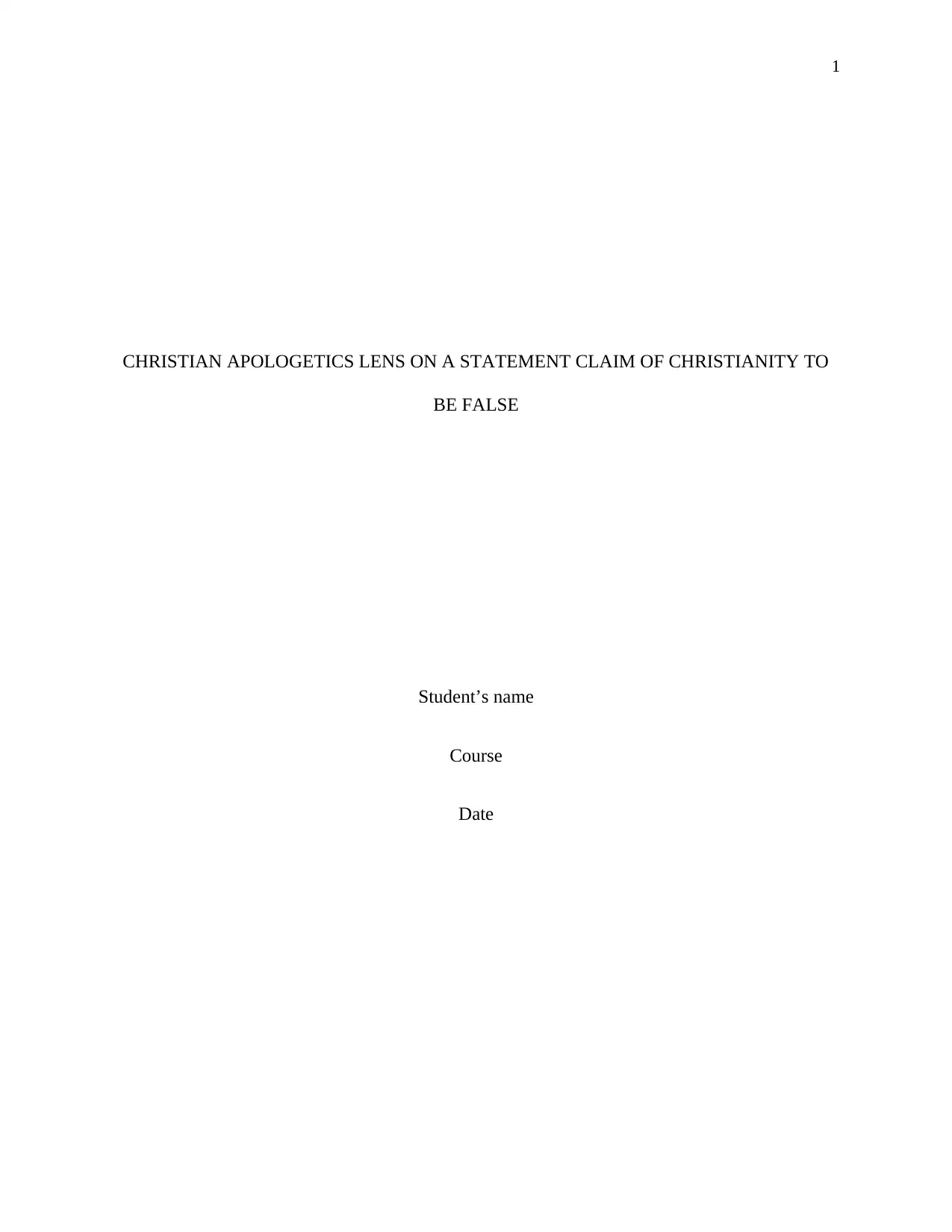
1
CHRISTIAN APOLOGETICS LENS ON A STATEMENT CLAIM OF CHRISTIANITY TO
BE FALSE
Student’s name
Course
Date
CHRISTIAN APOLOGETICS LENS ON A STATEMENT CLAIM OF CHRISTIANITY TO
BE FALSE
Student’s name
Course
Date
Secure Best Marks with AI Grader
Need help grading? Try our AI Grader for instant feedback on your assignments.
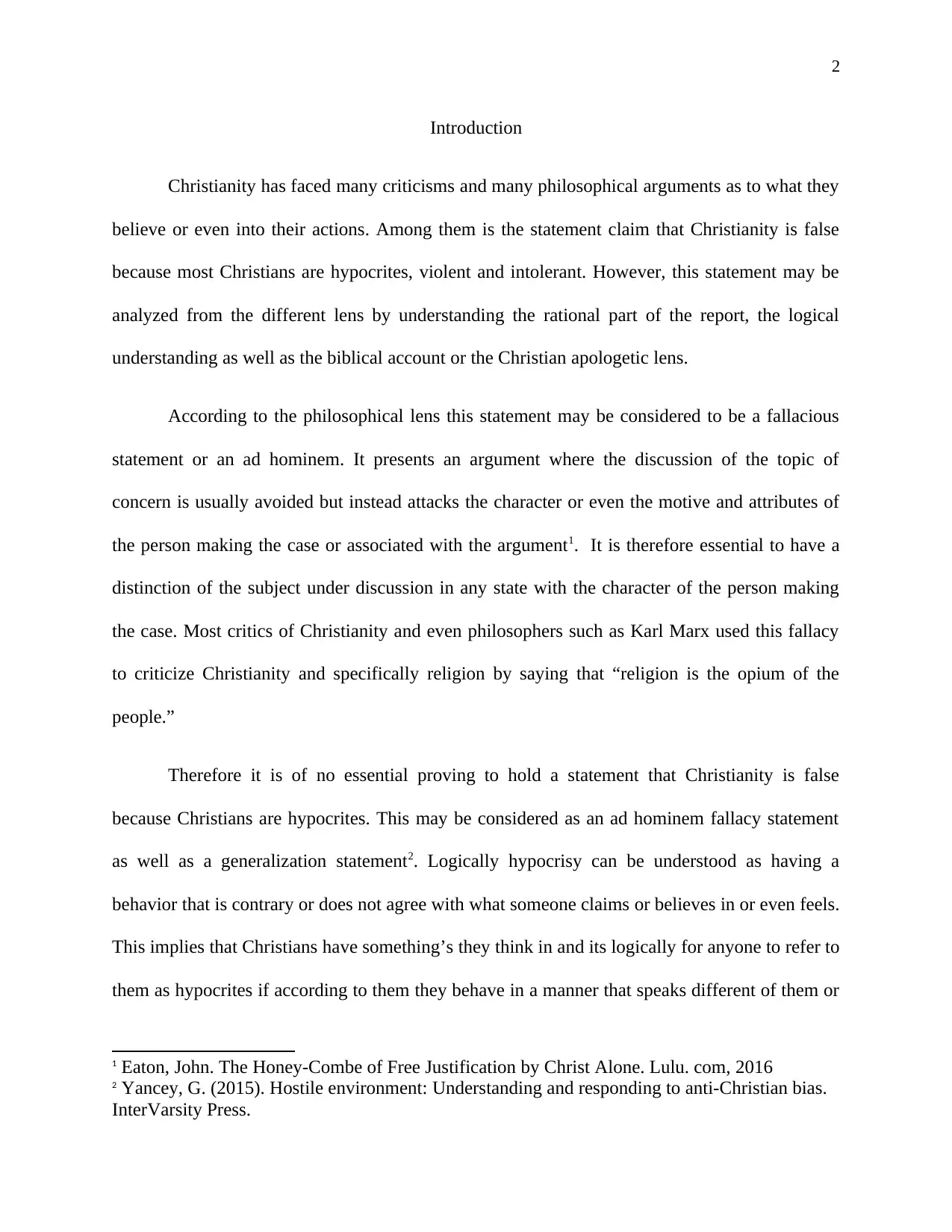
2
Introduction
Christianity has faced many criticisms and many philosophical arguments as to what they
believe or even into their actions. Among them is the statement claim that Christianity is false
because most Christians are hypocrites, violent and intolerant. However, this statement may be
analyzed from the different lens by understanding the rational part of the report, the logical
understanding as well as the biblical account or the Christian apologetic lens.
According to the philosophical lens this statement may be considered to be a fallacious
statement or an ad hominem. It presents an argument where the discussion of the topic of
concern is usually avoided but instead attacks the character or even the motive and attributes of
the person making the case or associated with the argument1. It is therefore essential to have a
distinction of the subject under discussion in any state with the character of the person making
the case. Most critics of Christianity and even philosophers such as Karl Marx used this fallacy
to criticize Christianity and specifically religion by saying that “religion is the opium of the
people.”
Therefore it is of no essential proving to hold a statement that Christianity is false
because Christians are hypocrites. This may be considered as an ad hominem fallacy statement
as well as a generalization statement2. Logically hypocrisy can be understood as having a
behavior that is contrary or does not agree with what someone claims or believes in or even feels.
This implies that Christians have something’s they think in and its logically for anyone to refer to
them as hypocrites if according to them they behave in a manner that speaks different of them or
1 Eaton, John. The Honey-Combe of Free Justification by Christ Alone. Lulu. com, 2016
2 Yancey, G. (2015). Hostile environment: Understanding and responding to anti-Christian bias.
InterVarsity Press.
Introduction
Christianity has faced many criticisms and many philosophical arguments as to what they
believe or even into their actions. Among them is the statement claim that Christianity is false
because most Christians are hypocrites, violent and intolerant. However, this statement may be
analyzed from the different lens by understanding the rational part of the report, the logical
understanding as well as the biblical account or the Christian apologetic lens.
According to the philosophical lens this statement may be considered to be a fallacious
statement or an ad hominem. It presents an argument where the discussion of the topic of
concern is usually avoided but instead attacks the character or even the motive and attributes of
the person making the case or associated with the argument1. It is therefore essential to have a
distinction of the subject under discussion in any state with the character of the person making
the case. Most critics of Christianity and even philosophers such as Karl Marx used this fallacy
to criticize Christianity and specifically religion by saying that “religion is the opium of the
people.”
Therefore it is of no essential proving to hold a statement that Christianity is false
because Christians are hypocrites. This may be considered as an ad hominem fallacy statement
as well as a generalization statement2. Logically hypocrisy can be understood as having a
behavior that is contrary or does not agree with what someone claims or believes in or even feels.
This implies that Christians have something’s they think in and its logically for anyone to refer to
them as hypocrites if according to them they behave in a manner that speaks different of them or
1 Eaton, John. The Honey-Combe of Free Justification by Christ Alone. Lulu. com, 2016
2 Yancey, G. (2015). Hostile environment: Understanding and responding to anti-Christian bias.
InterVarsity Press.
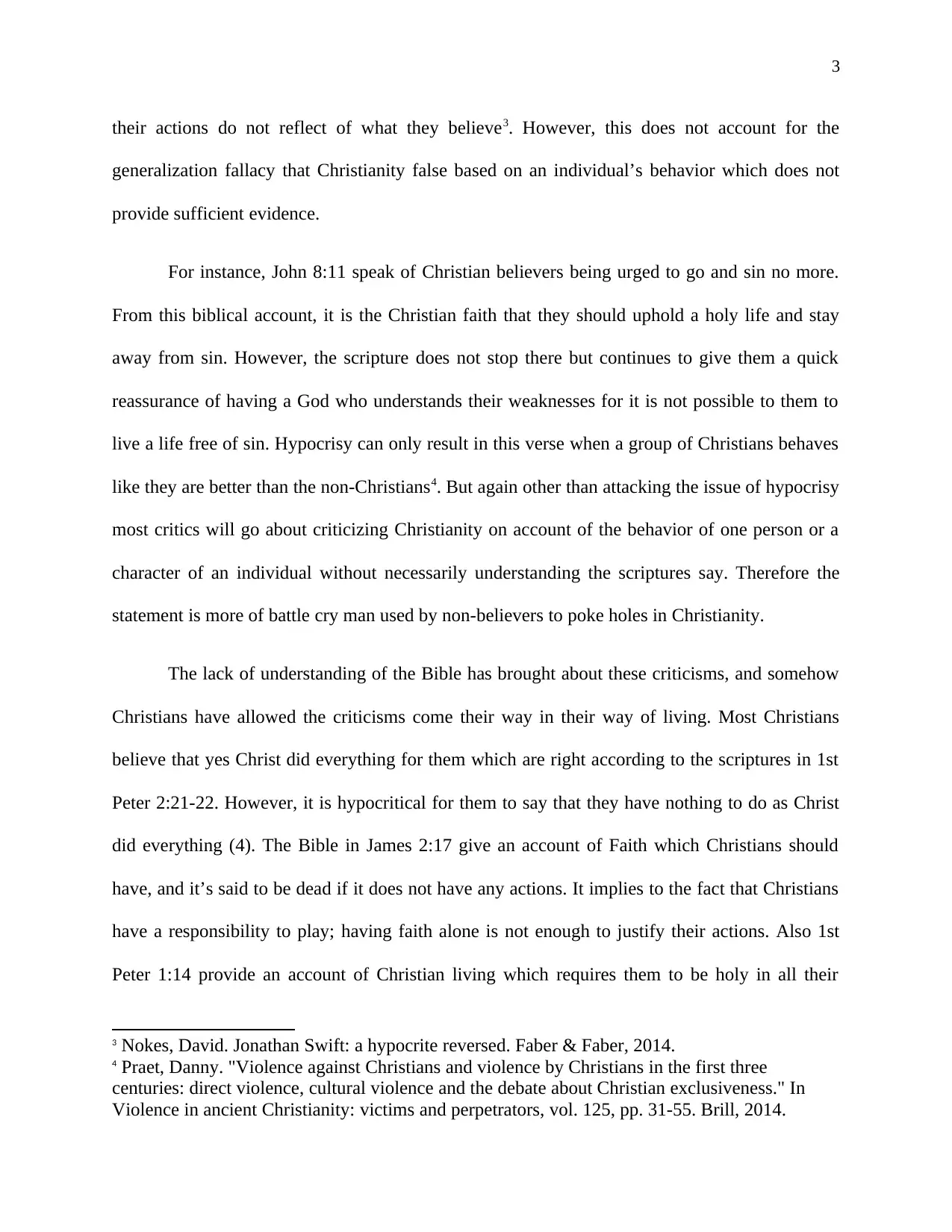
3
their actions do not reflect of what they believe3. However, this does not account for the
generalization fallacy that Christianity false based on an individual’s behavior which does not
provide sufficient evidence.
For instance, John 8:11 speak of Christian believers being urged to go and sin no more.
From this biblical account, it is the Christian faith that they should uphold a holy life and stay
away from sin. However, the scripture does not stop there but continues to give them a quick
reassurance of having a God who understands their weaknesses for it is not possible to them to
live a life free of sin. Hypocrisy can only result in this verse when a group of Christians behaves
like they are better than the non-Christians4. But again other than attacking the issue of hypocrisy
most critics will go about criticizing Christianity on account of the behavior of one person or a
character of an individual without necessarily understanding the scriptures say. Therefore the
statement is more of battle cry man used by non-believers to poke holes in Christianity.
The lack of understanding of the Bible has brought about these criticisms, and somehow
Christians have allowed the criticisms come their way in their way of living. Most Christians
believe that yes Christ did everything for them which are right according to the scriptures in 1st
Peter 2:21-22. However, it is hypocritical for them to say that they have nothing to do as Christ
did everything (4). The Bible in James 2:17 give an account of Faith which Christians should
have, and it’s said to be dead if it does not have any actions. It implies to the fact that Christians
have a responsibility to play; having faith alone is not enough to justify their actions. Also 1st
Peter 1:14 provide an account of Christian living which requires them to be holy in all their
3 Nokes, David. Jonathan Swift: a hypocrite reversed. Faber & Faber, 2014.
4 Praet, Danny. "Violence against Christians and violence by Christians in the first three
centuries: direct violence, cultural violence and the debate about Christian exclusiveness." In
Violence in ancient Christianity: victims and perpetrators, vol. 125, pp. 31-55. Brill, 2014.
their actions do not reflect of what they believe3. However, this does not account for the
generalization fallacy that Christianity false based on an individual’s behavior which does not
provide sufficient evidence.
For instance, John 8:11 speak of Christian believers being urged to go and sin no more.
From this biblical account, it is the Christian faith that they should uphold a holy life and stay
away from sin. However, the scripture does not stop there but continues to give them a quick
reassurance of having a God who understands their weaknesses for it is not possible to them to
live a life free of sin. Hypocrisy can only result in this verse when a group of Christians behaves
like they are better than the non-Christians4. But again other than attacking the issue of hypocrisy
most critics will go about criticizing Christianity on account of the behavior of one person or a
character of an individual without necessarily understanding the scriptures say. Therefore the
statement is more of battle cry man used by non-believers to poke holes in Christianity.
The lack of understanding of the Bible has brought about these criticisms, and somehow
Christians have allowed the criticisms come their way in their way of living. Most Christians
believe that yes Christ did everything for them which are right according to the scriptures in 1st
Peter 2:21-22. However, it is hypocritical for them to say that they have nothing to do as Christ
did everything (4). The Bible in James 2:17 give an account of Faith which Christians should
have, and it’s said to be dead if it does not have any actions. It implies to the fact that Christians
have a responsibility to play; having faith alone is not enough to justify their actions. Also 1st
Peter 1:14 provide an account of Christian living which requires them to be holy in all their
3 Nokes, David. Jonathan Swift: a hypocrite reversed. Faber & Faber, 2014.
4 Praet, Danny. "Violence against Christians and violence by Christians in the first three
centuries: direct violence, cultural violence and the debate about Christian exclusiveness." In
Violence in ancient Christianity: victims and perpetrators, vol. 125, pp. 31-55. Brill, 2014.
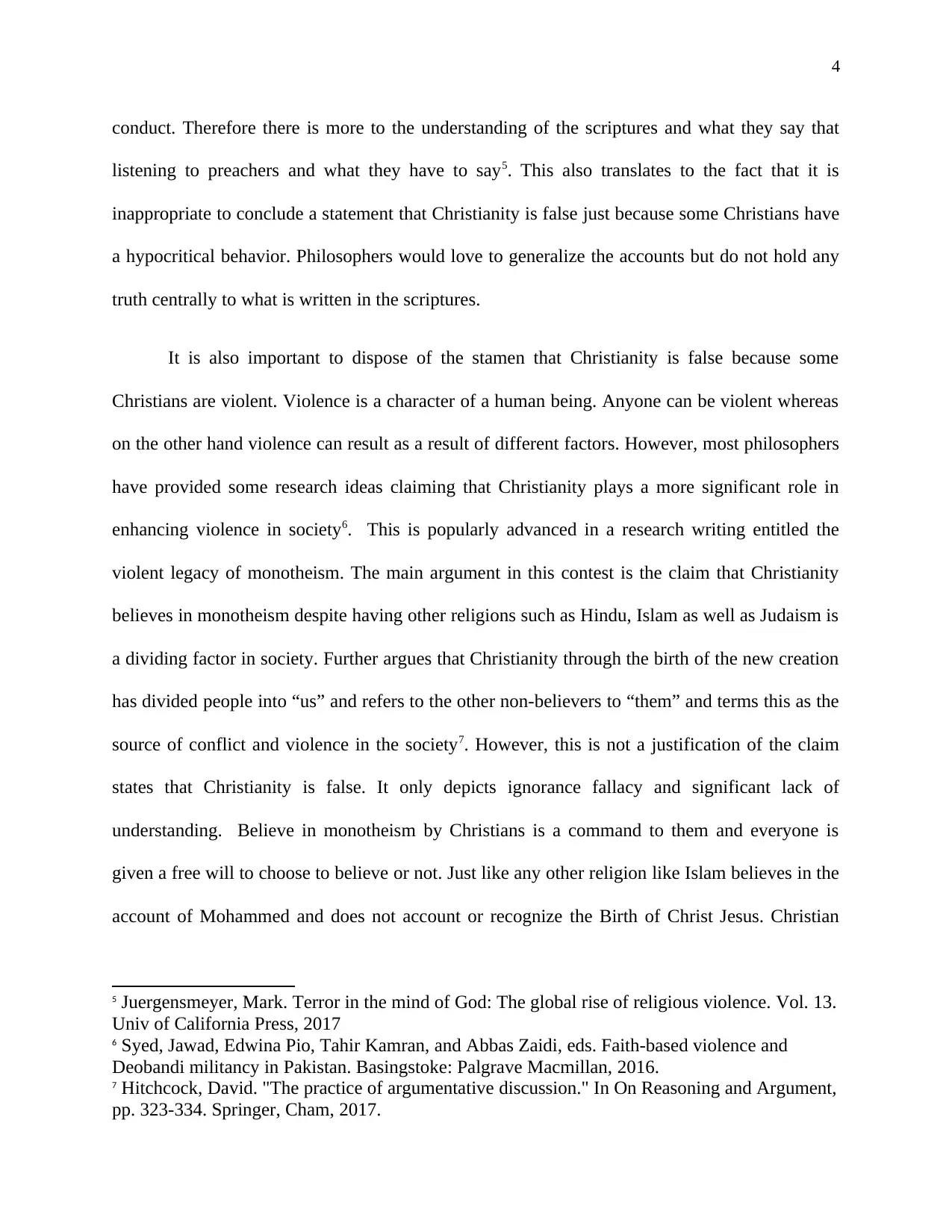
4
conduct. Therefore there is more to the understanding of the scriptures and what they say that
listening to preachers and what they have to say5. This also translates to the fact that it is
inappropriate to conclude a statement that Christianity is false just because some Christians have
a hypocritical behavior. Philosophers would love to generalize the accounts but do not hold any
truth centrally to what is written in the scriptures.
It is also important to dispose of the stamen that Christianity is false because some
Christians are violent. Violence is a character of a human being. Anyone can be violent whereas
on the other hand violence can result as a result of different factors. However, most philosophers
have provided some research ideas claiming that Christianity plays a more significant role in
enhancing violence in society6. This is popularly advanced in a research writing entitled the
violent legacy of monotheism. The main argument in this contest is the claim that Christianity
believes in monotheism despite having other religions such as Hindu, Islam as well as Judaism is
a dividing factor in society. Further argues that Christianity through the birth of the new creation
has divided people into “us” and refers to the other non-believers to “them” and terms this as the
source of conflict and violence in the society7. However, this is not a justification of the claim
states that Christianity is false. It only depicts ignorance fallacy and significant lack of
understanding. Believe in monotheism by Christians is a command to them and everyone is
given a free will to choose to believe or not. Just like any other religion like Islam believes in the
account of Mohammed and does not account or recognize the Birth of Christ Jesus. Christian
5 Juergensmeyer, Mark. Terror in the mind of God: The global rise of religious violence. Vol. 13.
Univ of California Press, 2017
6 Syed, Jawad, Edwina Pio, Tahir Kamran, and Abbas Zaidi, eds. Faith-based violence and
Deobandi militancy in Pakistan. Basingstoke: Palgrave Macmillan, 2016.
7 Hitchcock, David. "The practice of argumentative discussion." In On Reasoning and Argument,
pp. 323-334. Springer, Cham, 2017.
conduct. Therefore there is more to the understanding of the scriptures and what they say that
listening to preachers and what they have to say5. This also translates to the fact that it is
inappropriate to conclude a statement that Christianity is false just because some Christians have
a hypocritical behavior. Philosophers would love to generalize the accounts but do not hold any
truth centrally to what is written in the scriptures.
It is also important to dispose of the stamen that Christianity is false because some
Christians are violent. Violence is a character of a human being. Anyone can be violent whereas
on the other hand violence can result as a result of different factors. However, most philosophers
have provided some research ideas claiming that Christianity plays a more significant role in
enhancing violence in society6. This is popularly advanced in a research writing entitled the
violent legacy of monotheism. The main argument in this contest is the claim that Christianity
believes in monotheism despite having other religions such as Hindu, Islam as well as Judaism is
a dividing factor in society. Further argues that Christianity through the birth of the new creation
has divided people into “us” and refers to the other non-believers to “them” and terms this as the
source of conflict and violence in the society7. However, this is not a justification of the claim
states that Christianity is false. It only depicts ignorance fallacy and significant lack of
understanding. Believe in monotheism by Christians is a command to them and everyone is
given a free will to choose to believe or not. Just like any other religion like Islam believes in the
account of Mohammed and does not account or recognize the Birth of Christ Jesus. Christian
5 Juergensmeyer, Mark. Terror in the mind of God: The global rise of religious violence. Vol. 13.
Univ of California Press, 2017
6 Syed, Jawad, Edwina Pio, Tahir Kamran, and Abbas Zaidi, eds. Faith-based violence and
Deobandi militancy in Pakistan. Basingstoke: Palgrave Macmillan, 2016.
7 Hitchcock, David. "The practice of argumentative discussion." In On Reasoning and Argument,
pp. 323-334. Springer, Cham, 2017.
Secure Best Marks with AI Grader
Need help grading? Try our AI Grader for instant feedback on your assignments.
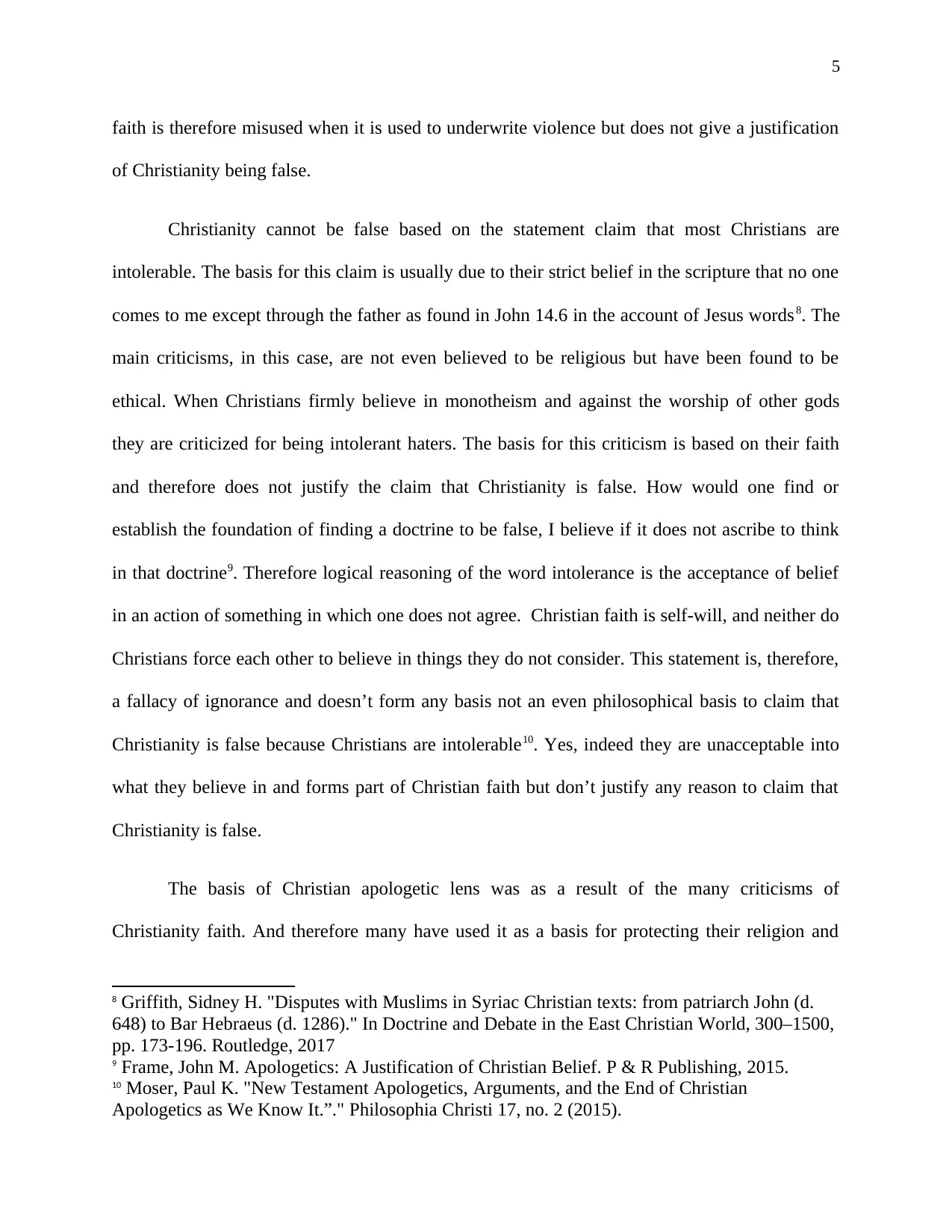
5
faith is therefore misused when it is used to underwrite violence but does not give a justification
of Christianity being false.
Christianity cannot be false based on the statement claim that most Christians are
intolerable. The basis for this claim is usually due to their strict belief in the scripture that no one
comes to me except through the father as found in John 14.6 in the account of Jesus words8. The
main criticisms, in this case, are not even believed to be religious but have been found to be
ethical. When Christians firmly believe in monotheism and against the worship of other gods
they are criticized for being intolerant haters. The basis for this criticism is based on their faith
and therefore does not justify the claim that Christianity is false. How would one find or
establish the foundation of finding a doctrine to be false, I believe if it does not ascribe to think
in that doctrine9. Therefore logical reasoning of the word intolerance is the acceptance of belief
in an action of something in which one does not agree. Christian faith is self-will, and neither do
Christians force each other to believe in things they do not consider. This statement is, therefore,
a fallacy of ignorance and doesn’t form any basis not an even philosophical basis to claim that
Christianity is false because Christians are intolerable10. Yes, indeed they are unacceptable into
what they believe in and forms part of Christian faith but don’t justify any reason to claim that
Christianity is false.
The basis of Christian apologetic lens was as a result of the many criticisms of
Christianity faith. And therefore many have used it as a basis for protecting their religion and
8 Griffith, Sidney H. "Disputes with Muslims in Syriac Christian texts: from patriarch John (d.
648) to Bar Hebraeus (d. 1286)." In Doctrine and Debate in the East Christian World, 300–1500,
pp. 173-196. Routledge, 2017
9 Frame, John M. Apologetics: A Justification of Christian Belief. P & R Publishing, 2015.
10 Moser, Paul K. "New Testament Apologetics, Arguments, and the End of Christian
Apologetics as We Know It.”." Philosophia Christi 17, no. 2 (2015).
faith is therefore misused when it is used to underwrite violence but does not give a justification
of Christianity being false.
Christianity cannot be false based on the statement claim that most Christians are
intolerable. The basis for this claim is usually due to their strict belief in the scripture that no one
comes to me except through the father as found in John 14.6 in the account of Jesus words8. The
main criticisms, in this case, are not even believed to be religious but have been found to be
ethical. When Christians firmly believe in monotheism and against the worship of other gods
they are criticized for being intolerant haters. The basis for this criticism is based on their faith
and therefore does not justify the claim that Christianity is false. How would one find or
establish the foundation of finding a doctrine to be false, I believe if it does not ascribe to think
in that doctrine9. Therefore logical reasoning of the word intolerance is the acceptance of belief
in an action of something in which one does not agree. Christian faith is self-will, and neither do
Christians force each other to believe in things they do not consider. This statement is, therefore,
a fallacy of ignorance and doesn’t form any basis not an even philosophical basis to claim that
Christianity is false because Christians are intolerable10. Yes, indeed they are unacceptable into
what they believe in and forms part of Christian faith but don’t justify any reason to claim that
Christianity is false.
The basis of Christian apologetic lens was as a result of the many criticisms of
Christianity faith. And therefore many have used it as a basis for protecting their religion and
8 Griffith, Sidney H. "Disputes with Muslims in Syriac Christian texts: from patriarch John (d.
648) to Bar Hebraeus (d. 1286)." In Doctrine and Debate in the East Christian World, 300–1500,
pp. 173-196. Routledge, 2017
9 Frame, John M. Apologetics: A Justification of Christian Belief. P & R Publishing, 2015.
10 Moser, Paul K. "New Testament Apologetics, Arguments, and the End of Christian
Apologetics as We Know It.”." Philosophia Christi 17, no. 2 (2015).
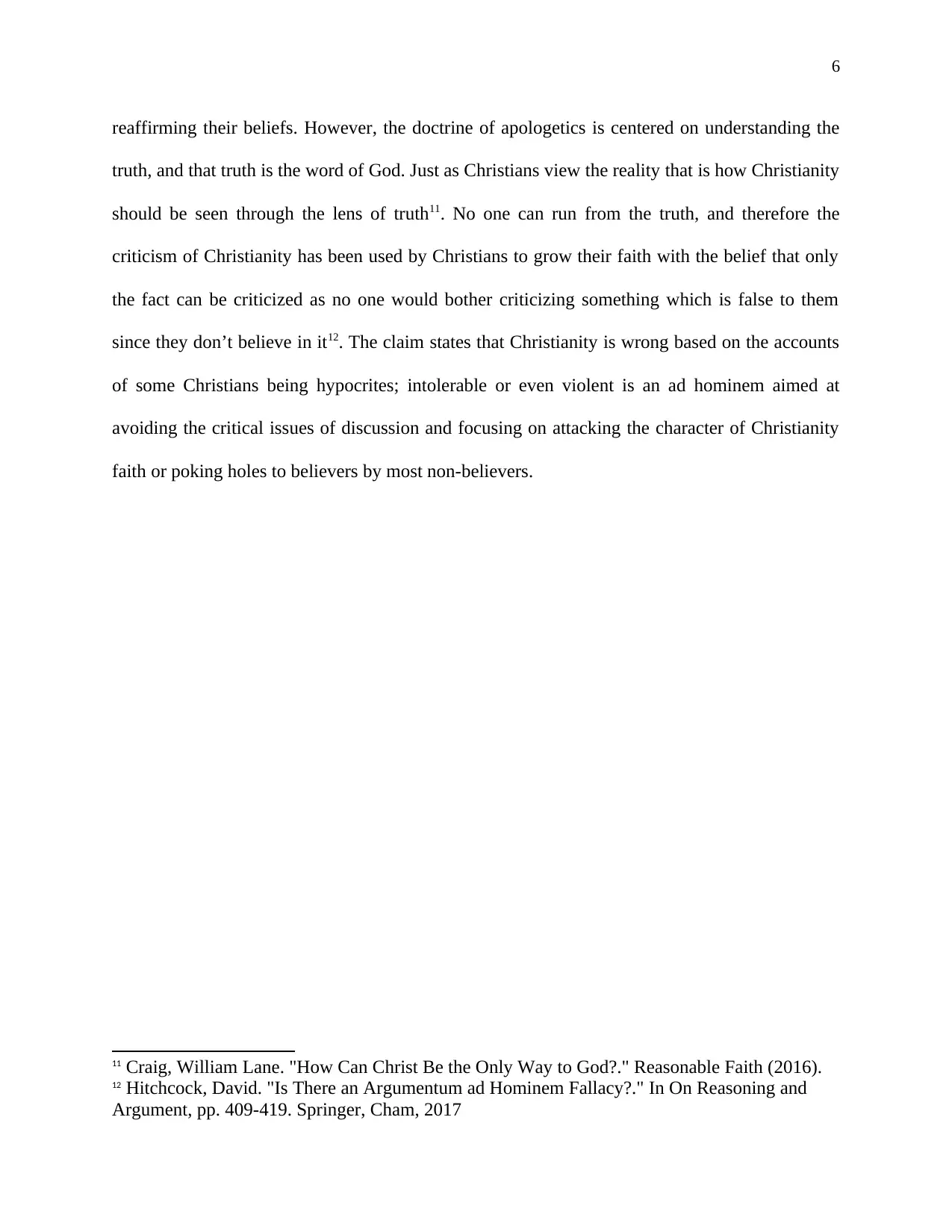
6
reaffirming their beliefs. However, the doctrine of apologetics is centered on understanding the
truth, and that truth is the word of God. Just as Christians view the reality that is how Christianity
should be seen through the lens of truth11. No one can run from the truth, and therefore the
criticism of Christianity has been used by Christians to grow their faith with the belief that only
the fact can be criticized as no one would bother criticizing something which is false to them
since they don’t believe in it12. The claim states that Christianity is wrong based on the accounts
of some Christians being hypocrites; intolerable or even violent is an ad hominem aimed at
avoiding the critical issues of discussion and focusing on attacking the character of Christianity
faith or poking holes to believers by most non-believers.
11 Craig, William Lane. "How Can Christ Be the Only Way to God?." Reasonable Faith (2016).
12 Hitchcock, David. "Is There an Argumentum ad Hominem Fallacy?." In On Reasoning and
Argument, pp. 409-419. Springer, Cham, 2017
reaffirming their beliefs. However, the doctrine of apologetics is centered on understanding the
truth, and that truth is the word of God. Just as Christians view the reality that is how Christianity
should be seen through the lens of truth11. No one can run from the truth, and therefore the
criticism of Christianity has been used by Christians to grow their faith with the belief that only
the fact can be criticized as no one would bother criticizing something which is false to them
since they don’t believe in it12. The claim states that Christianity is wrong based on the accounts
of some Christians being hypocrites; intolerable or even violent is an ad hominem aimed at
avoiding the critical issues of discussion and focusing on attacking the character of Christianity
faith or poking holes to believers by most non-believers.
11 Craig, William Lane. "How Can Christ Be the Only Way to God?." Reasonable Faith (2016).
12 Hitchcock, David. "Is There an Argumentum ad Hominem Fallacy?." In On Reasoning and
Argument, pp. 409-419. Springer, Cham, 2017
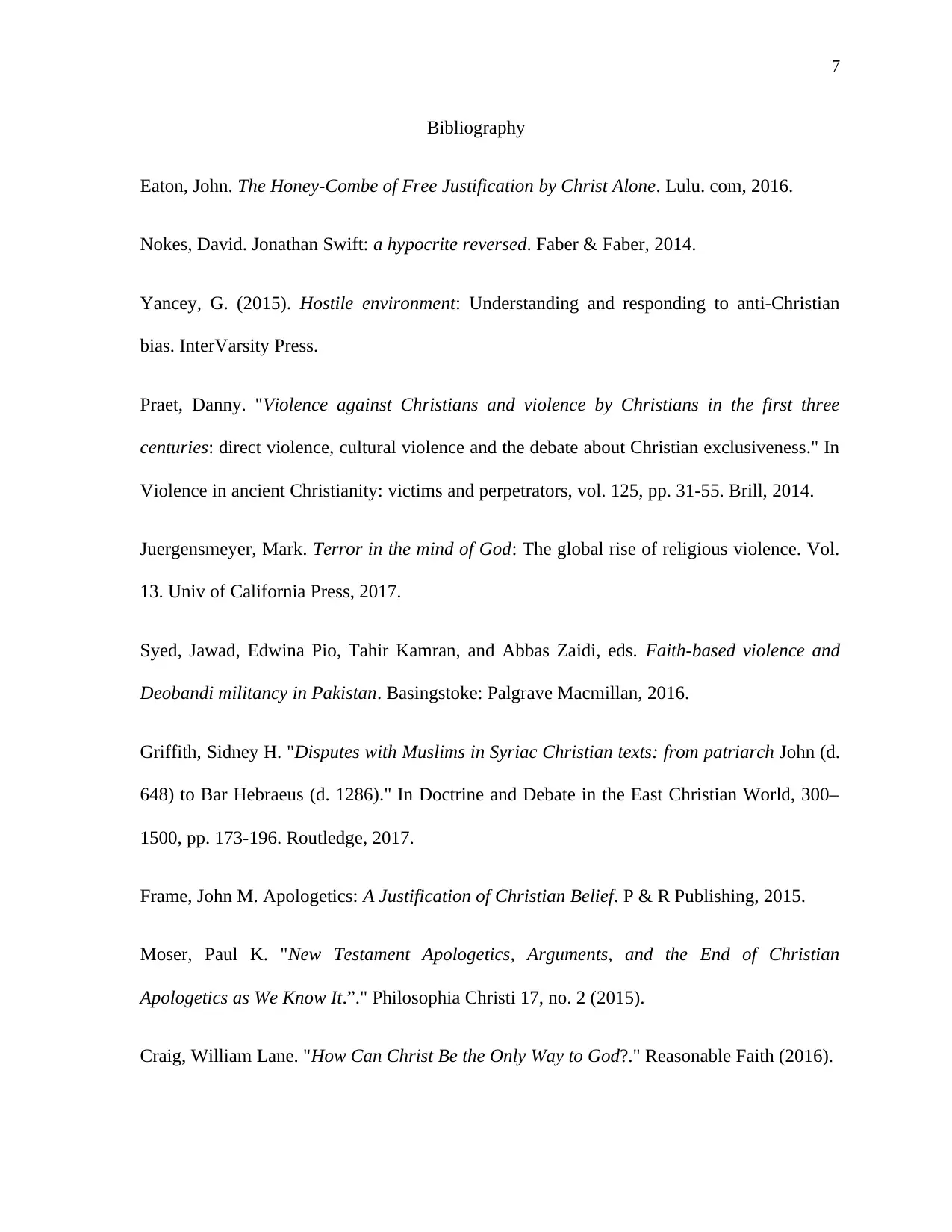
7
Bibliography
Eaton, John. The Honey-Combe of Free Justification by Christ Alone. Lulu. com, 2016.
Nokes, David. Jonathan Swift: a hypocrite reversed. Faber & Faber, 2014.
Yancey, G. (2015). Hostile environment: Understanding and responding to anti-Christian
bias. InterVarsity Press.
Praet, Danny. "Violence against Christians and violence by Christians in the first three
centuries: direct violence, cultural violence and the debate about Christian exclusiveness." In
Violence in ancient Christianity: victims and perpetrators, vol. 125, pp. 31-55. Brill, 2014.
Juergensmeyer, Mark. Terror in the mind of God: The global rise of religious violence. Vol.
13. Univ of California Press, 2017.
Syed, Jawad, Edwina Pio, Tahir Kamran, and Abbas Zaidi, eds. Faith-based violence and
Deobandi militancy in Pakistan. Basingstoke: Palgrave Macmillan, 2016.
Griffith, Sidney H. "Disputes with Muslims in Syriac Christian texts: from patriarch John (d.
648) to Bar Hebraeus (d. 1286)." In Doctrine and Debate in the East Christian World, 300–
1500, pp. 173-196. Routledge, 2017.
Frame, John M. Apologetics: A Justification of Christian Belief. P & R Publishing, 2015.
Moser, Paul K. "New Testament Apologetics, Arguments, and the End of Christian
Apologetics as We Know It.”." Philosophia Christi 17, no. 2 (2015).
Craig, William Lane. "How Can Christ Be the Only Way to God?." Reasonable Faith (2016).
Bibliography
Eaton, John. The Honey-Combe of Free Justification by Christ Alone. Lulu. com, 2016.
Nokes, David. Jonathan Swift: a hypocrite reversed. Faber & Faber, 2014.
Yancey, G. (2015). Hostile environment: Understanding and responding to anti-Christian
bias. InterVarsity Press.
Praet, Danny. "Violence against Christians and violence by Christians in the first three
centuries: direct violence, cultural violence and the debate about Christian exclusiveness." In
Violence in ancient Christianity: victims and perpetrators, vol. 125, pp. 31-55. Brill, 2014.
Juergensmeyer, Mark. Terror in the mind of God: The global rise of religious violence. Vol.
13. Univ of California Press, 2017.
Syed, Jawad, Edwina Pio, Tahir Kamran, and Abbas Zaidi, eds. Faith-based violence and
Deobandi militancy in Pakistan. Basingstoke: Palgrave Macmillan, 2016.
Griffith, Sidney H. "Disputes with Muslims in Syriac Christian texts: from patriarch John (d.
648) to Bar Hebraeus (d. 1286)." In Doctrine and Debate in the East Christian World, 300–
1500, pp. 173-196. Routledge, 2017.
Frame, John M. Apologetics: A Justification of Christian Belief. P & R Publishing, 2015.
Moser, Paul K. "New Testament Apologetics, Arguments, and the End of Christian
Apologetics as We Know It.”." Philosophia Christi 17, no. 2 (2015).
Craig, William Lane. "How Can Christ Be the Only Way to God?." Reasonable Faith (2016).
Paraphrase This Document
Need a fresh take? Get an instant paraphrase of this document with our AI Paraphraser
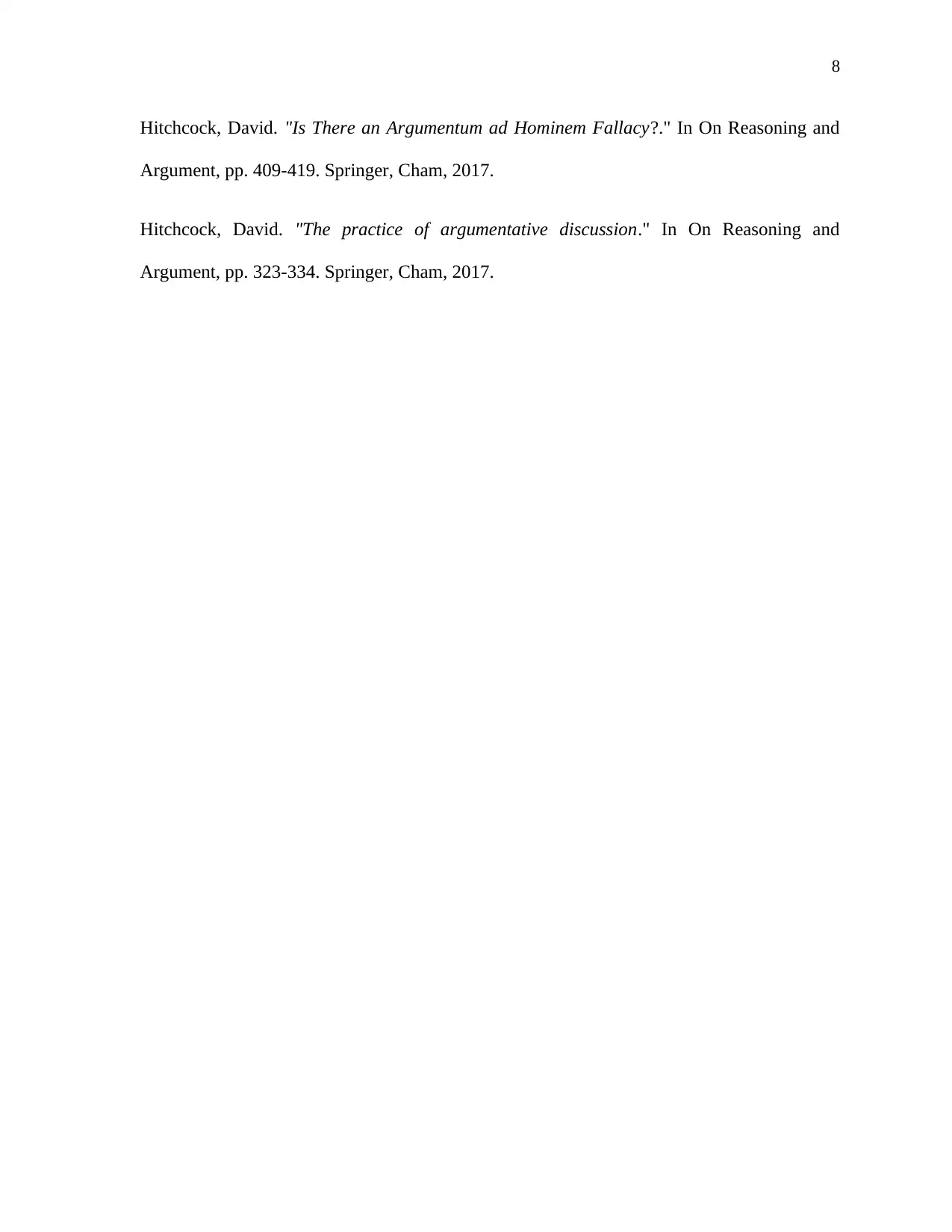
8
Hitchcock, David. "Is There an Argumentum ad Hominem Fallacy?." In On Reasoning and
Argument, pp. 409-419. Springer, Cham, 2017.
Hitchcock, David. "The practice of argumentative discussion." In On Reasoning and
Argument, pp. 323-334. Springer, Cham, 2017.
Hitchcock, David. "Is There an Argumentum ad Hominem Fallacy?." In On Reasoning and
Argument, pp. 409-419. Springer, Cham, 2017.
Hitchcock, David. "The practice of argumentative discussion." In On Reasoning and
Argument, pp. 323-334. Springer, Cham, 2017.
1 out of 8
Your All-in-One AI-Powered Toolkit for Academic Success.
+13062052269
info@desklib.com
Available 24*7 on WhatsApp / Email
![[object Object]](/_next/static/media/star-bottom.7253800d.svg)
Unlock your academic potential
© 2024 | Zucol Services PVT LTD | All rights reserved.